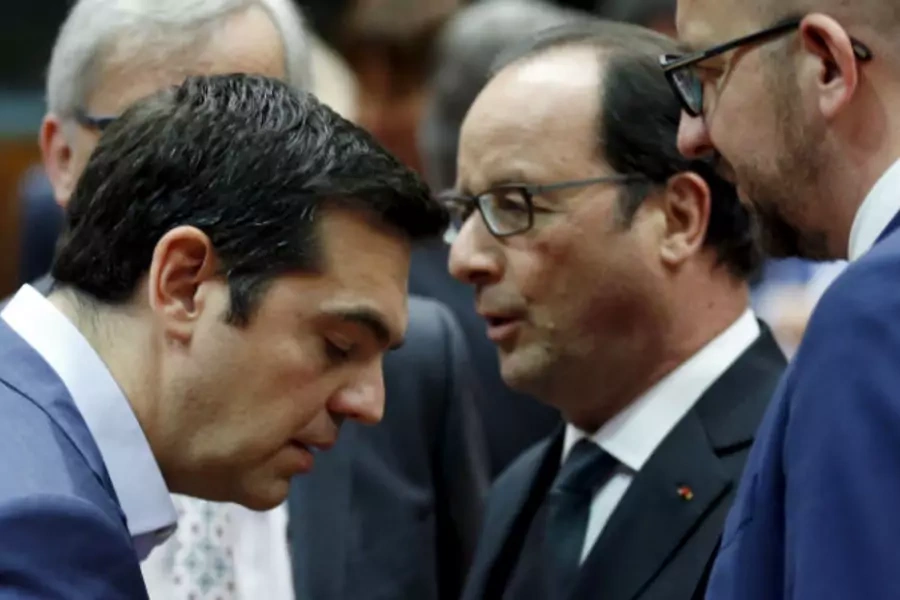More on:
European finance ministers are meeting this morning amidst deep divides over whether, and on what terms, to provide a lifeline to Greece. Finance Ministers will not agree to a deal, with Germany (and other skeptical governments) resisting pressure from France and Italy for concessions to Greece. Leaders will have to decide.
As of this writing, it looks likely that there could be some broad agreement to negotiate a deal, but not a deal itself. Greece will be asked to take a number of tough upfront measures, actions that will politically and economically stress the country beyond anything we have seen to date. If this is too much to ask, and it may well be, Greece’s exit from the Eurozone could quickly follow.
The gridlock in Brussels reflects three basic forces at work.
The need is massive. The Greek request was for €53.5 billion (around $59 billion) over three years, but the actual need is much greater. Factoring in a realistic assessment of the damage caused by the standoff, as well as a rapidly rising cost to recapitalize the banks, and the bill soars to over $80 billion for the three years. While more than half reflects debt service (total amortization over the period equals €30 billion and interest payments another €17 billion, the majority of which is owed to European creditor governments) the commitment of new money, after so many failed efforts, is proving to be a huge impediment to action. The financing gap also forces the IMF back to the table, as their money will now be needed. The dire state of the Greek economy has forced realism, making kick-the-can solutions harder to justify.
Trust is missing. The standoff of the last several months has destroyed trust between the sides, making it far more difficult for some governments (Germany importantly, but they are not alone) to accept the political and financial costs of a multi-year financing package when so much depends on implementation by the Greek government. In an odd way, the decision by the Greek government to do a U-turn on Thursday and in essence fully accept creditor proposals that it had previously railed against validated skeptics’ view that their commitment to implement reform is weak.
The program is likely to fail. To paraphrase a popular commercial, finance ministers negotiate deals: that’s what they do. But getting a deal done isn’t success unless it charts a course for Greece to become competitive and generate sustainable growth within the eurozone. Otherwise, any deal—even if Europe bends on debt relief so that the numbers add up—is a bridge to nowhere. I still believe there is a path forward for Greece—a “grand bargain” that combines a massive reform effort with massive financing and debt relief—but the window is narrow and there is no doubt that the events of the past month have raised significant doubts among European leaders as to whether Greece—economically and politically, can manage a transition where previous Greek governments have failed. Even the best designed program begins with a high probability of failure.
At the same time, it is hard to see how Greece can survive much longer without an up-front infusion of cash that keeps euros in the ATMs and supports private activity. This will require forbearance on the part of the ECB, and that in turn requires backing from leaders. As I have argued from the start of this crisis, ultimately it is domestic economic and financial conditions, and the stress caused by arrears and a breakdown of the Greek financial system, that will determine the timing of the Grexit decision.
From caterpillar to butterfly
Slovak Finance Minister Peter Kazimir on Saturday summarized his skepticism in a tweet:
Following latest developments, listening to #Greece govt officials one can wonder how quickly can caterpillar turn into butterfly #Eurozone
— Peter Kažimír (@KazimirPeter) July 10, 2015
To do that in the first instance means quickly implementing a number of early actions that show a commitment to reform, and agree on a number of additional actions. According to leaks this morning, those additional actions include: (i) Ambitious pension reforms to fully eliminate the pension deficit (currently, the drain on the budget from pensions stands at around 10 percent of GDP); (ii) More ambitious product market reforms ; (iii) Privatization of the electricity transmission network operator (ADMIE); (iv) On labor markets, best practice on collective bargaining, pay and labor practices inconsistent with Syriza election promises; and, (v) Aggressive actions to clean up the banking system.
Finland already has made clear its opposition to any deal, and finance ministers from a few other small countries have signaled their concerns. Under the EU’s emergency procedures, a deal can be agreed with support of 85 percent, so that small-country opposition cannot stop an agreement, but it raises the political hurdle for leaders already under pressure from legislatures back home.
A further impediment at this point is Germany’s steadfast refusal to accept a nominal haircut on the debt, which it sees as a violation of EU rules and a dangerous precedent. While very substantial debt relief can be provided through a further extension of maturities and low interest rates, the IMF has already made it clear that it thinks that nominal haircuts will eventually be needed. And, given the significant austerity that is being asked of it, it will be difficult for the Greek government to sign a deal that doesn’t contain at least a nod in this direction. In the first post on this blog, I called for a Paris Club for Europe, an idea Germany has for the first time yesterday hinted at in a non-paper circulating at the meeting. Something along these lines will need to be part of any long-term solution if indeed we are to see a butterfly take flight.
More on:
 Online Store
Online Store
